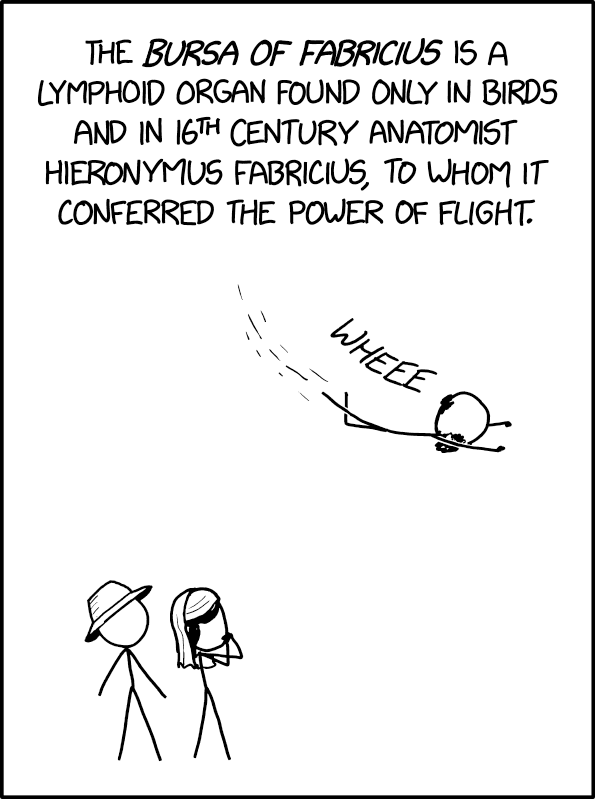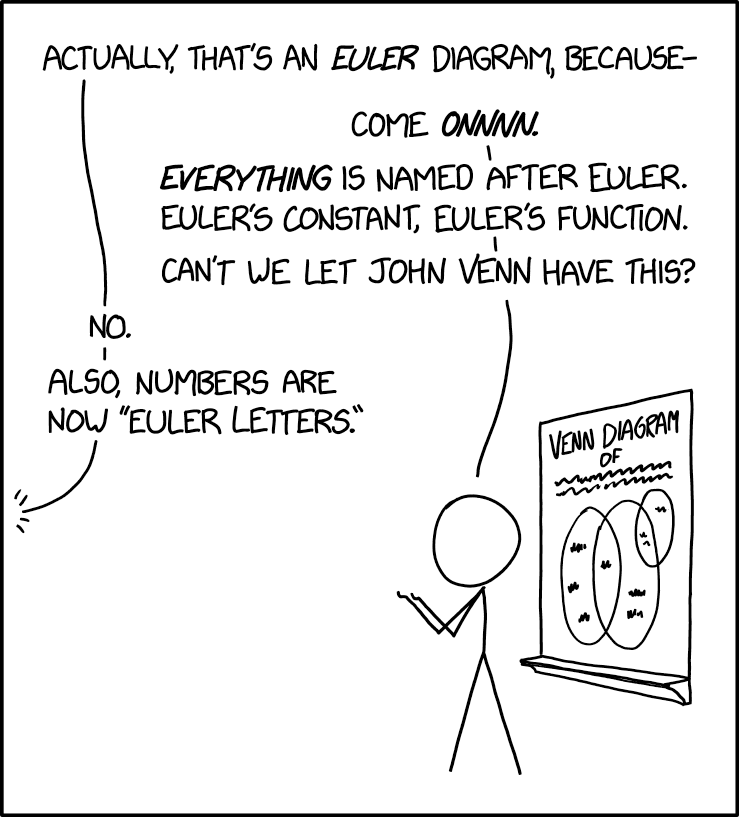Named anatomy
« previous post | next post »
Today's xkcd:
Mouseover title: "If an anatomical structure is named for a person, it means they were the only person to have it. Pierre Paul Broca had a special area of his brain that created powerful magnetic fields, enabling him to do 19th century fMRI research."
Background links: Bursa of Fabricius; Hieronymus Fabricius; Broca's area; Pierre Paul Broca.
The joke behind the mouseover title, of course, is that the semantic relation between NAME and THING, in terms like NAME's THING or (the) THING of NAME, is ambiguous (or vague, your choice).
My reaction, primed by xkcd's examples, was that anatomical instances of such patterns always refer to their discoverer, not to their notable possessor. But a quick scan of Wikipedia's List of human anatomical parts named after people turns up two exceptions — which happen to be the first two in alphabetical order: Achilles tendon and Adam's apple.
Things are different, both syntactically and semantically, for places named after people. Algorithms are also somewhat different. Scientific names of organisms seem to be rather like places. No doubt commenters will point to other ontological categories, like tools, theorems, industrial and chemical processes, scientific laws (real or jocular — see also), common names of organisms, etc.
There are also some morphosyntactic differences worth following up on — thus theorems and laws named after people are mostly of the form NAME's THING, whereas awards named after people are mostly of the form the NAME THING.
The divergent patterns seem to reflect sociological rather than semantic differences, for the most part — though maybe there's a tinge of semantics in "Boyle's law" vs. "the Nobel prize"? Or "Sturgeon's law" vs. "the Streisand effect"?
Update — see also this recent xkcd:
Mouseover title: "Things Leonhard Euler created ( most of math ( overlapping circle diagrams ) a cricket bowling machine ) Things John Venn created".
Update #2: I was surprised to find that the internet is apparently ignorant of "Dobbin's Law" ("If it doesn't work, you need a bigger hammer"), which was frequently quoted by co-workers during my career as an aircraft mechanic…
Update #3: John Venn was apparently also responsible for the frequency theory of probability.


bks said,
February 2, 2023 @ 8:44 am
Is Nike the Greek word for victory or the name of the Greek god of victory?
Ross Presser said,
February 2, 2023 @ 8:48 am
@bks Google Translate says English "victory" = Greek "νίκη".
https://translate.google.com/?sl=en&tl=el&text=victory&op=translate
(In fact given the appearance of the nu, I can imagine that the Latins just grabbed "vic" from looking at the Greek written out and started pronouncing it how they wanted to. I have no idea if that's believable or not.)
Ross Presser said,
February 2, 2023 @ 8:50 am
Just one note on algorithms: Most seem to be named after the inventor but some are more about the content, e.g. "Mersenne Twister" was not invented by Mersenne, but is based on the math concept Mersenne primes, which themselves are named after their discoverer.
[(myl) Not to speak of things like Ariadne's thread…]
mg said,
February 2, 2023 @ 10:20 am
There's also Stigler's law of eponymy. From Wikipedia:
https://en.wikipedia.org/wiki/Stigler%27s_law_of_eponymy
Rodger Cunningham said,
February 2, 2023 @ 10:44 am
Ross, no, it's not believable, but I like it.
Personally I think the Bursa of Fabricius sounds like a holy relic in an adventure story.
Jerry Packard said,
February 2, 2023 @ 12:10 pm
We have ‘Broca’s aphasia’ which seems to fall into the category of theorem/law, but where did “… special area of his brain that created powerful magnetic fields…” come from?
And then we have ‘circle of Willis’ rather than ‘Willis’ circle’, etc.
[(myl) No, "Broca's aphasia" is a named disorder, like "Wernicke's aphasia", "Crohn's disease", "Parkinson's disease", etc. And the joke about Broca's magnetic fields is that his hypothesis about functional localization was based on correlation of disabilities with locations of brain damage determined by post mortem, not by MRI (or fMRI) brain imaging, which depends on machines using very strong magnetic fields and sophisticated digital processing…]
ohwilleke said,
February 2, 2023 @ 12:35 pm
A related observation is that almost all female specific parts of a woman's anatomy which are named after someone are named after male gynecologists.
DBMG said,
February 2, 2023 @ 1:28 pm
A thought after reading Jerry Packard's post – might "(thing) of (name)" be preferred for names that end with s (Fabricius, Willis, isles of Langerhans, bundle of His…) or things that begin with s (Sphincter of Oddi)?
David W said,
February 2, 2023 @ 1:48 pm
There is a long discussion of medical eponyms here:
https://litfl.com/de-eponymising-anatomical-terminology/
"In response to a recent Twitter debate we set out to evaluate the hypothesis that ‘There is ALWAYS an alternative to the dead man’s name for body parts‘ and create an online searchable database to facilitate the de-eponymification of anatomic terminology."
Matt said,
February 2, 2023 @ 3:31 pm
In terms of adding the possessive or not, I wonder if the likelihood of pluralisation comes into play in avoiding the multiple “S” ending.
They give out multiple Nobel prizes per year, we create multiple Venn Diagrams, etc. Perhaps these would sound more awkward as Nobel’s prizes, Venn’s diagrams etc?
Scientific (etc) laws tend not to be pluralised as much, so can more comfortably take either form. The only plurals I can immediately think of are Newton’s Laws of Motion, and Asimov’s laws of robotics.
There are no doubt so many exceptions on both sides that this will prove to be an utterly inadequate explanation, which other commenters can begin pointing out in 3… 2… 1…
Jim McCormack said,
February 2, 2023 @ 3:49 pm
I am reminded of a parody grant proposal I saw many years ago.
The purported professor was located at 'Fabricius University', and the financial contact for the granting agency was the Bursar of Fabricius.
Richard Hershberger said,
February 2, 2023 @ 4:25 pm
I am utterly enchanted to learn that Venn invented a cricket bowling machine.
Anthony said,
February 2, 2023 @ 6:25 pm
"Airy disk" has a nice ring…"Airy's" not so much.
Philip Anderson said,
February 2, 2023 @ 6:56 pm
@Matt
Prizes are received as well as given, so Nobel’s Prize would be ambiguous, in a way that Parkinson’s Law isn’t.
We also get adjectival forms of certain scientists’ names, such as Newtonian, Darwinian, Hamiltonian, Euclidean.
DaveK said,
February 2, 2023 @ 7:23 pm
The unattributed version of Dobbins’ Law I always heard was “Don’t try to force it, just get a bigger hammer”.
I’m happy to know who to credit for that wisdom.
Steve Morrison said,
February 2, 2023 @ 9:11 pm
@Matt: Also Kepler’s laws. (Three laws, in all of these cases.)
Matt said,
February 3, 2023 @ 7:58 am
@Philip Yep, that sounds like a better explanation than mine. I withdraw any suggestion that pluralisation as being relevant.
@Steve all the examples are three laws because, if they only had 2, they would have simply written the word “and” then joined them together into a single law :-)
unekdoud said,
February 3, 2023 @ 9:45 am
To be really annoying, you could use NAME THING from Friday to Monday, and NAME's THING from Tuesday to Thursday.
Ross Presser said,
February 3, 2023 @ 2:57 pm
In science fiction, we have "Niven Ring" and "Dyson Sphere" and "Nicoll-Dyson laser", but also "Niven's Law", "Clarke's third law"
Philip Anderson said,
February 3, 2023 @ 6:35 pm
Perusing the list of named laws, principles etc inWikipedia, the vast majority have an apostrophe, including Bayes’ Theorem and Gauss’s Law. The regular exception seems to be hyphenated names, whether it’s one double-barrelled individual or two.
https://en.m.wikipedia.org/wiki/List_of_eponymous_laws
/df said,
February 4, 2023 @ 2:09 pm
@Ross Presser
Amusing idea regarding "νίκη", but "victoria" is formed from the verb "vincere", traditionally rendered "conquer" as in "veni, vidi, *vici*", whose past participle is "victus". Hence "victor", a winner who might be awarded a triumph or have won all the games ("… ludorum"), and thus "victoria", what a "victor" achieved. The root pre-dates known alphabets.
"νίκη" is not just unrelated to "victoria" but apparently has no ancient cognates.
TIC Redux said,
March 12, 2023 @ 4:14 pm
I'm waaay late to this post, but I just can't leave without mentioning the awesomely named (mathematical!) term Witch of Agnesi…